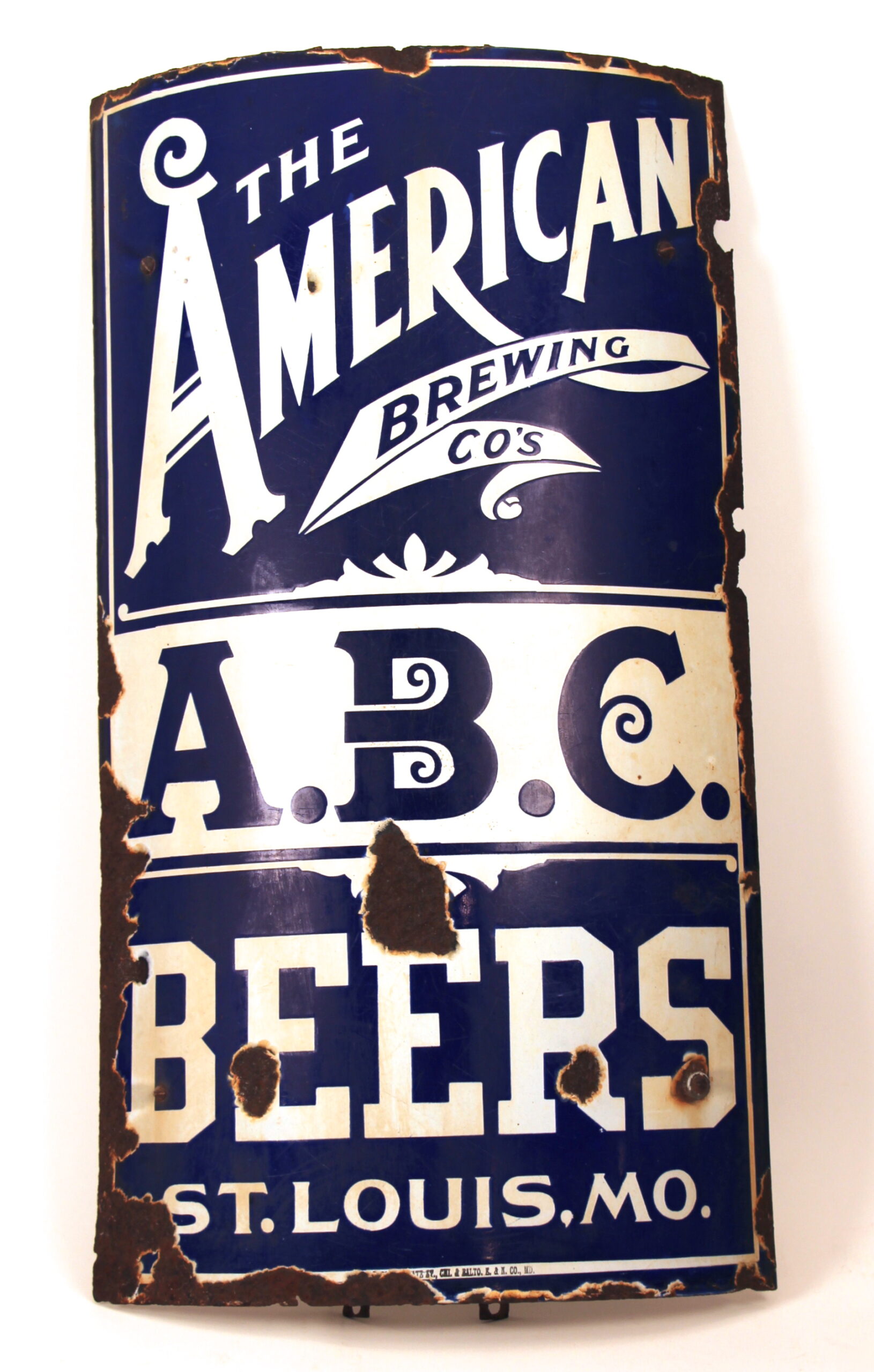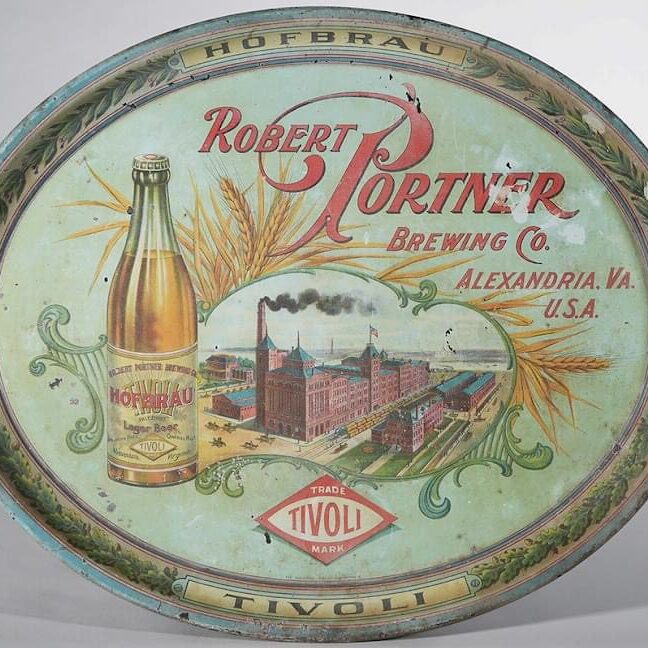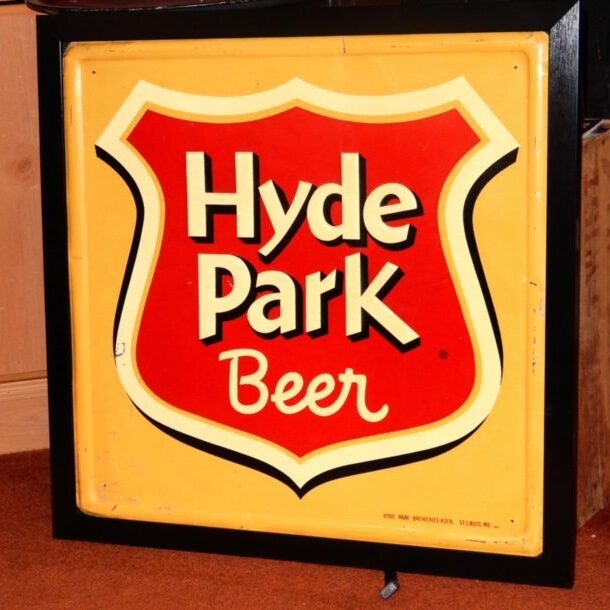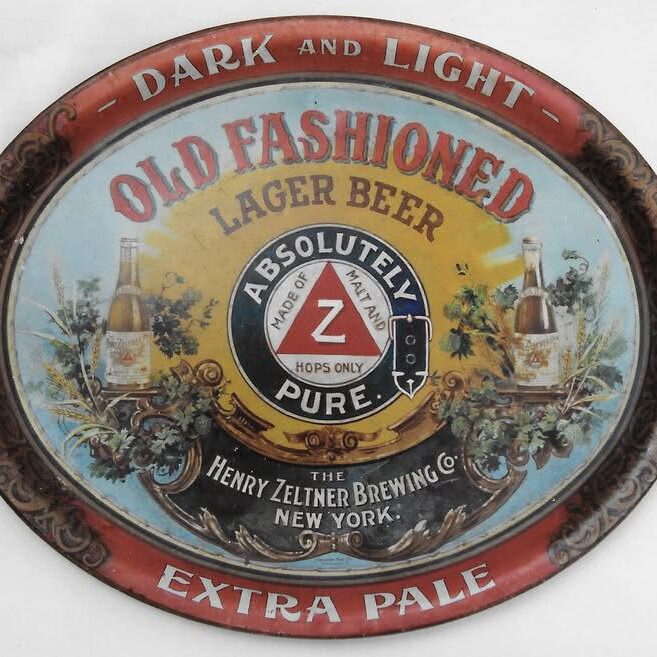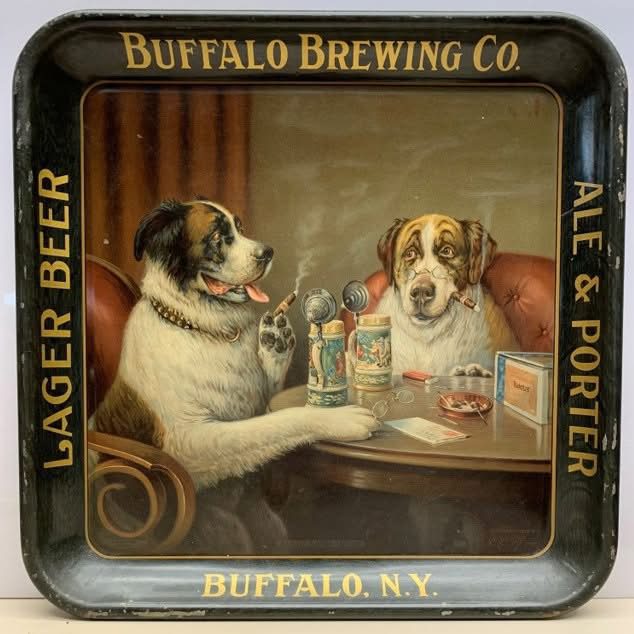This is an enamel porcelain corner sign made by the American Brewing Company (A.B.C.) based in St. Louis, Missouri, circa 1900. The corner sign is a blue and white curved porcelain sign that was displayed during Pre-Prohibition outside of a saloon. It reads, “American Brewing Co’s, A.B.C. Beers, St. Louis, MO.”
The backside of this corner sign is shaped with a 90-degree angle frame designed to fit on the edge of a building, usually where two walls would meet. It is a semi-permanent outdoor sign. With its curved-shape, the sign could especially fit snug around the edge of a building. This A.B.C. Beer brand porcelain sign is considered rare and valuable to Breweriana collectors.
A.B.C. Beer was one of the first innovative American brewers to ship long distances in the United States, Mexico, South America, Japan, Philippines, Egypt and Cuba. The company exported beer in refrigerated box cars that allowed the beer to not spoil. The brewery was also the original “King Of All Bottled Beers”. This advertising slogan often showed with it two winged cherubs proudly crowning the top of an A.B.C bottled Bohemian beer, it’s flagship beer brand.
The American Brewing Company began in 1890 in St. Louis, Missouri as a family brewery with the Koehler family. The start of A.B.C. actually began with the end of another Koehler family brewery Excelsior Brewing Company. Excelsior originated in 1857 and lasted until 1889 when it sold out to the St. Louis Brewing Association syndicate.
However, the Koehler family quickly returned to the brewery business and soon became an early successful industry giant selling all over the world in the United and foreign countries. They produced their own malt and specialized in bottling their bear. The company shipped worldwide to the United States, Mexico, South America, Japan, Philippines, Egypt and Cuba.
The American Brewing Co. was a prolific advertiser and was marketed extensively around the world. Their beer advertising extended to point of purchase displays, signs, serving trays, steins, clocks, magazine ads, trade cards and postcards.
Some point of purchase advertising sent to South America included phrases in Spanish. One magazine ad featured a photograph showing a long train of the brewery’s boxcars driving away from the enormous St. Louis plant. The ad read “The St. Louis A.B.C. Beers are famous the World Over.” It also stated “St. Louis A.B.C. Bohemian Bottled Beer shipped to Manila, Philippine Islands, Nov. 1898.” Another A.B.C. Beer magazine ad asked “Bohemians of the American World to stand by their favorite beer. It promotes health and good cheer.”
A 1902 Redbook magazine ad featured a woman holding a bottle of the A.B.C. Bohemian beer and stated “The A.B.C. Bohemian Bottled Beer, containing the very heart and marrow of the Bohemian Hops, its creamy body makes for rich, red blood and puts solid healthy flesh on the wasted frame.”
A.B.C. even targeted its advertising on the back of a children’s “First Book of ABC’s”. A child reading the book would find “ Z is for Zeal to be shown in good things. Be it little maids, peasants or kings. A.B.C is the King of All Bottled Beers.”
When Prohibition hit the United States from 1920 to1933, it was a huge blow to large shipping breweries like A.B.C. So for a while, the company produced a brand cereal beverage and soft drinks. The A.B.C. Company ultimately fell under the umbrella of the Independent Breweries Company (IBC), as a way to survive. However, once Prohibition ended, the bankrupt IBC saw a chance to sell some of its workable breweries to regain its investment. A.B.C. was one of them and was purchased by a Chicago syndicate.
The next several years were troublesome for the A.B.C. brand as it re-entered the competitive market following Repeal. It filed bankruptcy, had legal woes, reorganization and changing of hands a few more times. At one point, the St. Louis A.B.C. Brand was owned by the Al Capone led brewing syndicate out of Chicago, IL. It was said that Mr. Capone’s “boys” damaged the brewery one night when it was heavily vandalized. The ABC Company eventually went out of business in 1940.

